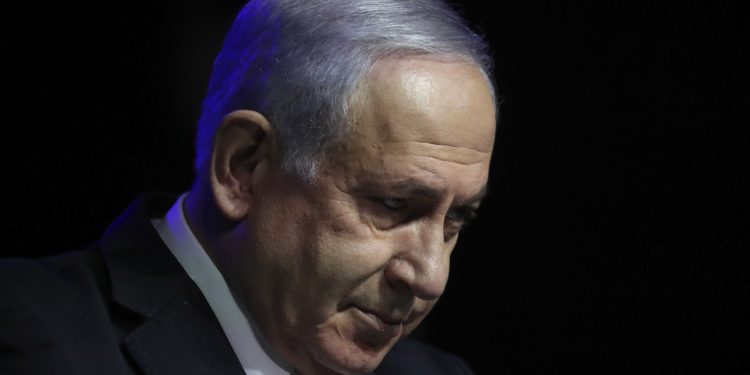Israel’s longest-serving Prime Minister Benjamin Netanyahu, mired in controversies ranging from financial fraud to communal polarisation for his own political survival, has been ousted from office June 13 by a loose coalition of rivals from across the political spectrum. The lowest common denominator of the coalition is the constituents’ wish to end Netanyahu’s 12-year rule. The Opposition leader, Yair Lapid, a centrist and former TV news anchor, won a confidence vote in the Knesset, Israel’s parliament, by a wafer thin majority of 60-59 seats to clinch the issue. Interestingly, the Israeli voter, though heavily polarized, never looked for an alternative during the campaign..
Lapid will not, however, become Prime Minister immediately, but his former foe and far-right advocate for the settler movement in the Palestinian territories, Naftali Bennett, has been sworn in as the country’s new PM. Under the power-sharing arrangement, Lapid’s term will come two years later when Bennett is to hand over power to him for the rest of the four-year term. The big question, of course, remains whether the new government will last till then.
Questions are being asked about the durability of the fragile coalition government for two reasons. First, there is virtually no cohesion among the partners of the coalition which is a medley of ideologically opposed politicians from hardline Jewish religious nationalists to centrists, Leftists and a small Arab Islamist group. Secondly, Netanyahu has made it clear during his speech in the Knesset while stepping down that his efforts from now on will be to topple the government terming it as ‘dangerous’.
Netanyahu incurred the wrath of many of his own people for his hawkish, right-wing policies geared towards dividing the people on communal lines.
The general perception is that he exacerbated the division so as to hang on to power. Bennett, who succeeds him, shares his same right wing policies. He was not only his ally, but also his chief of staff. But, there is a difference. Bennett is considered pragmatic and he is not averse to granting rights to the Palestinians. But, in the same breath, he has ruled out a Palestinian state. He wants Israel to maintain ultimate control over all the lands it occupies.
The immediate gain of the new development is that it ends a political deadlock that has seen four snap elections since 2019. During that time, Netanyahu skillfully managed to keep his rivals bickering and divided while he clung to power, even after he had been indicted in three criminal corruption cases on charges he denies.
Over the past few years Netanyahu made enemies of his friends for his egocentrism, personal and public paranoia and avarice. He is himself to blame for the unification of opposition forces cutting across the political spectrum. The 11-day-long war last month, between Israel and the Hamas in Gaza, that left a trail of death and destruction with the loss of about 250 lives, including scores of children, was totally unwarranted. It was the result of Netanyahu’s unnecessary support to right wing elements which deliberately confronted the Arabs in Israel when they were observing Ramadan. No wonder, anti-Netanyahu protesters, who held rallies outside the Prime Minister’s residence in Jerusalem for months calling for his ouster, gathered June 12 night with a black banner stretched across a wall that read: “Bye Bye, Bibi, Bye bye.” After the new government was voted in, thousands of Israelis waving the blue and white David star flag cheered and danced in central Tel Aviv. This summed the mood of a majority of the people in Israel who are tired of Netanyahu’s electoral manipulations. They want the new government to act to improve the economy that is faltering due to the pandemic.
It may be noted that the new coalition has put in public domain its agreements that deliberately skirt contentious issues such as the Israel-Palestine conflict, and concentrate on issues of daily bread and butter. They show the new government would focus mostly on issues such as passing a state Budget and building new hospitals, rather than risk an internal fight. Bennett is unlikely to use, any time soon, his executive powers as PM to further solidify the occupation.
The new trajectory is dictated by the nature of the coalition which is an unlikely assortment of eight parties, including the anti-occupation and dovish Meretz, hawkish figures on the right such as Avigdor Lieberman and Arab Islamist members of parliament belonging to the United Arab List. The latter, made up of Palestinian citizens of Israel, will become the first party from the country’s sizeable Arab minority ever to join a government. Its leader, Mansour Abbas, is seen as a realist. He has claimed to have secured guarantees from hard-right coalition partners for greater rights for Palestinian citizens of Israel, including non-discriminatory housing policies, as well as several billions of pounds for infrastructure in Arab areas. Predictably, other Arab politicians in Israel have accused Abbas of abandoning his principles.
The Hamas and their supporter, Iran, don’t find reasons to expect any fundamental change of policies from the new government. But, given the tension that reached feverish pitch in the past few weeks, the experiment may act as a welcome move to cool down tempers and tone down hawkish rhetoric. If it succeeds, it may have some lessons to offer to other countries in the world currently bearing the brunt of communal polarization.






































